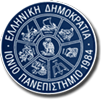Ερευνητικές Ομάδες
BARLAK HASANΙδιότητα: Assistant Professor, University of Sinop, Sinop, Turkey
Αντικείμενο στο Πρόγραμμα:
Hasan Barlak was born in Köprübaşı, Trabzon. He completed his primary, secondary and high school educations in Samsun. Taking his undergraduate education at the Faculty of Theology, Ondokuz Mayıs University, he got his master’s degree with his thesis entitled “Arabs’ Understanding of Tribalism and its Influence on Political Affairs at the Time of Caliph Othman” at the Institute of Social Sciences of Ondokuz Mayıs University in 2006. Beginning his doctoral studies at the same university, he received his doctoral degree with a thesis entitled “Hijaz under the Rule of Ottoman Empire in Terms of Religion and Politics (1876-1909)” in 2013. Meanwhile, he worked as a teacher for the Ministry of National Education. In 2013, he started as an Assistant Professor at the Department of Modern History, Faculty of Science and Letters, Sinop University. He continues his duty in the same university. In addition to scientific studies, he has also been serving as the Vice Dean of the Faculty of Science and Letters for three and a half years. Hasan Barlak carries out studies on the Ottoman administration in the Middle East and Arab lands. His main focus is political, military and intellectual issues of the period between the rule of Abdul Hamid II (1876-1909) and the years of World War I (1914-1918). Also having an interest in the history of Africa, Barlak mainly investigates the relationships of Muslim communities of Africa with the Ottoman Empire. Furthermore, he studies intellectual movements in the final period of the Ottoman community, and Ottoman intellectuals in the modernisation process.
Επιστροφή




